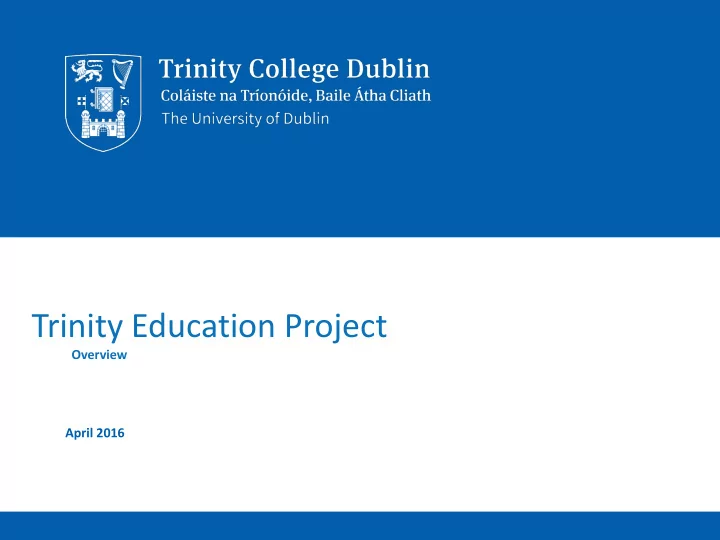

Trinity Education Project Overview April 2016
A Trinity Education 1 Trinity College Dublin, The University of Dublin
Governance Structure PROVOST CHAIR Vice Provost & Chief Academic Project Manager Steering Committee Officer Project Sponsor V. TECHNOLOGY VI. III. I. IV. INTERNSHIPS ENHANCED LEARNING ASSESSMENT II. CURRICULUM VII. STAKEHOLDER and GLOBAL LEARNING LEAD SPACES LEAD PRINCIPLES & LEAD DIFFERENTIATION MANAGEMENT, EXCHANGES Assoc. Dean for Librarian/ ARCHITECT. LEAD Senior and POSITIONNG COMMUNICATIONS LEAD On-Line Bursar & VP/Chief Academic Academic LEAD VP/Chief Academic VP Global Education/ Director Officer Developer, Dr Prof Geoghegan Officer Relations Director IT Strategic Ciara O’Farrell Services Innovation Strand I Team Strand II Team Strand III Team Strand IV Team Strand V Team Strand VI Team Strand VII Team Key: Colour coding denotes: Align and integrate with University wide strategies and projects such as Library D Strategy, Global Relations Strategy, E3 Strategy, Estates master-planning etc. Steering Other team Committee members Members Trinity College Dublin, The University of Dublin
Trinity Education Project Timeline 3 Trinity College Dublin, The University of Dublin
Strand 2: Curricular Principles & Architecture Trinity College Dublin, The University of Dublin 4
Trinity Education Project – Strand 2 Graduate Attributes Curriculum Principles Proposed Programme Architecture Trinity College Dublin, The University of Dublin 5
Graduate Attributes Attributes = Qualities, skills, understandings that students develop during their time at university, and that shape the contribution they make to their profession and to society. Throughout their time at Trinity, our students will be provided with opportunities to develop and evidence achievement of a range of graduate attributes that support their academic growth. Graduate attributes can be achieved in academic and co- and extra- curricular activities. 6 Trinity College Dublin, The University of Dublin
C = Attribute delivered by the Graduate Attributes (Institutional level) academic curriculum created by the course committee CC = Attribute delivered by Co- 1. to think curriculum (activities independently undertaken by the student) C Deep knowledge of an academic discipline C Ability to do independent research C Appreciation of knowledge beyond chosen field C Ability to analyse and 4. to act synthesise evidence resiliently 2. to communicate C,CC Be self-motivated effectively C,CC Ability to take responsibility C,CC Team membership skills C,CC Awareness to equality and sustainability C Ability to structure and present work C,CC Have global perspectives and viewpoints coherently C,CC Know how to deal with ambiguity C Ability to synthesise complex material C,CC Face open-ended challenges CC Be a connector 3. to grow C,CC Understand citizenship C Ability to write C,CC Ethically aware C Presentation skills continuous ly - C Digital skills C,CC Language skills C Have a passion for learning C Value life-long learning &CPD C,CC Flexibilty in response to changing environments C,CC Willingness to take risks CC Ability to develop social skills C,CC Commitment to career readiness In consideration from January 2016…… 7 Trinity College Dublin, The University of Dublin
The Trinity Curriculum The Trinity Curriculum is composed of the academic curriculum (credit-bearing) and the co- and extra-curriculum (non credit-bearing) . Co-curricular and extra-curricular activities - • an extension to a student’s university studies, complements the academic curriculum. • promotes the student’s academic, personal and professional development Examples include involvement with clubs and societies, volunteering, • peer mentoring, and summer work placements. Co-curricular specific types of activity formally recognised by the university – (possibly in an enhanced transcript) Extra-curricular activities are not formally recognised by the university for inclusion in the extension to the transcript. 8 Trinity College Dublin, The University of Dublin
Proposed Curriculum Principles The Trinity Curriculum will be structured around five principles. The curriculum for all undergraduate programmes will: • provide structured but flexible pathways that support the achievement of the programme-level outcomes and the development of the graduate attributes • be programme-focussed • be research-centered It will employ • a range of teaching, learning and assessment strategies and will be • supported by appropriate technology-enhanced approaches. 9 Trinity College Dublin, The University of Dublin
Trinity Education Project Decision levels 1. Decisions @ Institutional Level to include • Semesterisation & Academic Year Structure • Progression • Consolidation of entry routes (TGRUSE) • Appropriate balance between “depth” and “breadth” 2. Decisions @ School/Programme/Course level to include • Types of degree programme • How curriculum meets curricular principles • How curriculum enables development and achievement of graduate attributes for academic growth 10
Working definitions …. Core programme prescribed curriculum for the programme , includes mandatory and optional credit-bearing modules which can be taught and/or experience-based. Approved modules credit-bearing modules approved by the programme in related or complementary fields. “Free” elective modules elective credit-bearing modules not included in the list of core or approved modules and available to all students. They are chosen by the student subject to: (a) the student having the necessary, prior learning, (b) the School/discipline quota for the module not having been reached, (c) the timetable permitting the module selection. 5 Trinity College Dublin, The University of Dublin
Contacts… • Website : www.tcd.ie/academic-service/tep • Fedelma McNamara @ x3765 fmcnamar@tcd.ie trinityeducationproject@tcd.ie Trinity College Dublin, The University of Dublin 11
Thank You
Recommend
More recommend